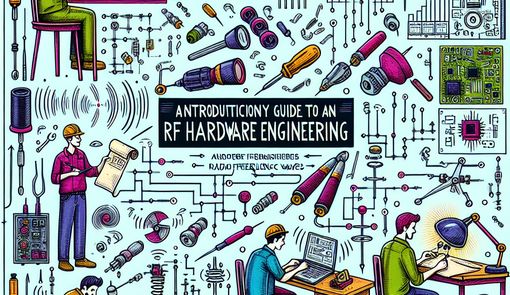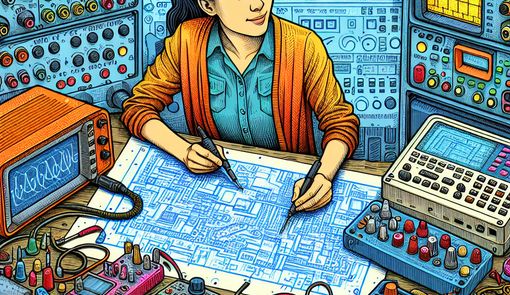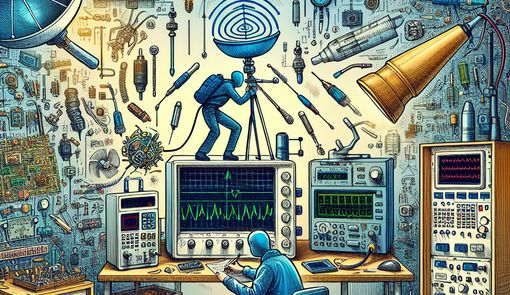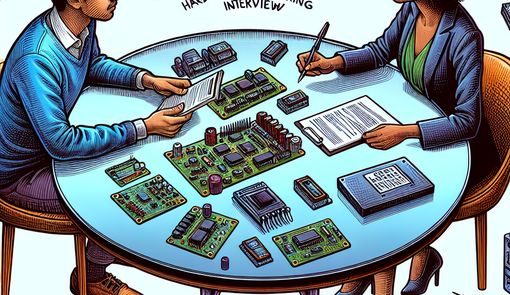RF Hardware Engineer
An RF Hardware Engineer specializes in designing and developing hardware components that utilize radio frequency signals for communication, navigation, or radar systems.

Top Articles for RF Hardware Engineer
Sample Job Descriptions for RF Hardware Engineer
Below are the some sample job descriptions for the different experience levels, where you can find the summary of the role, required skills, qualifications, and responsibilities.
Junior (0-2 years of experience)
Summary of the Role
Seeking a passionate Junior RF Hardware Engineer to design and develop radio frequency systems and circuits. Successful candidate will have the opportunity to work with cutting-edge technology in wireless communications and contribute to the creation of innovative products.
Required Skills
- Proficient in the use of RF design and measurement equipment.
- Strong analytical and problem-solving skills.
- Excellent verbal and written communication skills.
- Detail-oriented with strong organizational skills.
- Creative thinking with a passion for innovation.
- Ability to multitask and manage time effectively.
Qualifications
- Bachelor's degree in Electrical Engineering or related field.
- Understanding of RF principles, technologies, and systems.
- Familiarity with RF simulation and design tools such as ADS, CST, or HFSS.
- Ability to analyze and troubleshoot RF systems and components.
- Knowledge of industry standard communication protocols and frequencies.
- Ability to work collaboratively in a team environment.
Responsibilities
- Assist in the design and development of RF hardware components and systems.
- Support simulation and testing of RF circuits and subsystems.
- Collaborate with multidisciplinary teams to integrate RF hardware into various products.
- Contribute to the troubleshooting and resolving of RF system issues.
- Participate in design reviews and provide feedback on RF designs.
- Maintain accurate documentation for design and testing procedures.
- Stay updated with the latest RF technologies and industry trends.
Intermediate (2-5 years of experience)
Summary of the Role
As an RF Hardware Engineer, you will be responsible for the design, development, and testing of radio frequency (RF) components, circuits, and systems. You will work closely with cross-functional teams to develop hardware that meets both technical and customer requirements. This role requires a strong understanding of RF principles and the ability to apply them to create innovative solutions.
Required Skills
- Strong analytical and problem-solving skills.
- Excellent communication and teamwork abilities.
- Attention to detail and a focus on quality and precision.
- Time management skills with the ability to manage multiple projects simultaneously.
- Proficiency with CAD and simulation software.
- Knowledge of wireless communication protocols and system-level design.
- Understanding of EMC/EMI considerations for RF design.
Qualifications
- Bachelor's or Master's degree in Electrical Engineering, or a related field.
- 2-5 years of experience in RF hardware design and development.
- Proven ability to design and test RF circuits and systems.
- Experience with RF simulation tools such as ADS, HFSS, or CST.
- Understanding of RF components such as amplifiers, mixers, oscillators, and antennas.
- Proficiency in the use of test equipment like network analyzers, spectrum analyzers, and signal generators.
- Familiarity with PCB design and layout techniques for RF applications.
- Knowledge of industry standards and regulatory requirements for RF systems.
- Ability to work effectively in a fast-paced and collaborative environment.
Responsibilities
- Develop RF hardware circuits and systems for communication, radar, or other wireless applications.
- Perform RF simulations and modeling to predict system performance before hardware fabrication.
- Collaborate with other engineers and cross-functional teams to integrate RF hardware into overall system designs.
- Conduct tests and validate hardware performance against design specifications.
- Troubleshoot RF systems and components to identify and rectify issues.
- Contribute to the preparation of technical documentation, including design specifications and test reports.
- Support the transition from prototype to production, ensuring manufacturability and quality targets are met.
- Stay informed about the latest RF technologies and industry trends to drive innovation.
Senior (5+ years of experience)
Summary of the Role
Seeking a Senior RF Hardware Engineer to design, develop, and troubleshoot radio frequency (RF) hardware for various applications. The ideal candidate will bring a strong background in RF system design and a track record of innovative solutions in high-frequency electronics.
Required Skills
- Strong knowledge of RF principles, systems, and testing methodologies.
- Proficiency in designing RF circuits and systems for high frequency applications.
- Experience with PCB layout and design for RF applications.
- Skilled in using CAD tools for RF design.
- Ability to work in a fast-paced, results-oriented environment.
- Analytical skills to diagnose and solve complex technical problems.
- Leadership and mentorship skills to guide junior team members.
Qualifications
- Bachelor's or Master's degree in Electrical Engineering, or a related field.
- Minimum of 5 years of experience in RF hardware design and development.
- Proven experience with RF simulation tools such as HFSS, CST, or ADS.
- Familiarity with wireless communication standards and protocols.
- Experience in conducting RF testing and measurements using network analyzers, spectrum analyzers, and other RF test equipment.
- Eligibility to work in the intended country of employment.
- Excellent communication and teamwork skills.
Responsibilities
- Lead the design and development of RF hardware components and systems, ensuring technical performance meets specifications.
- Conduct simulations and modeling of RF circuits to validate designs before physical implementation.
- Collaborate with cross-functional teams to integrate RF hardware into broader systems.
- Mentor junior engineers and provide guidance in RF design principles and practices.
- Stay updated with the latest RF technologies and advancements to incorporate into new designs.
- Troubleshoot and resolve complex RF hardware issues in both pre-production and production stages.
- Lead the testing and validation processes for RF hardware, ensuring compliance with industry standards.
- Prepare technical documentation, including design specifications, test plans, and reports.
See other roles in Science and Technology and Telecommunications






